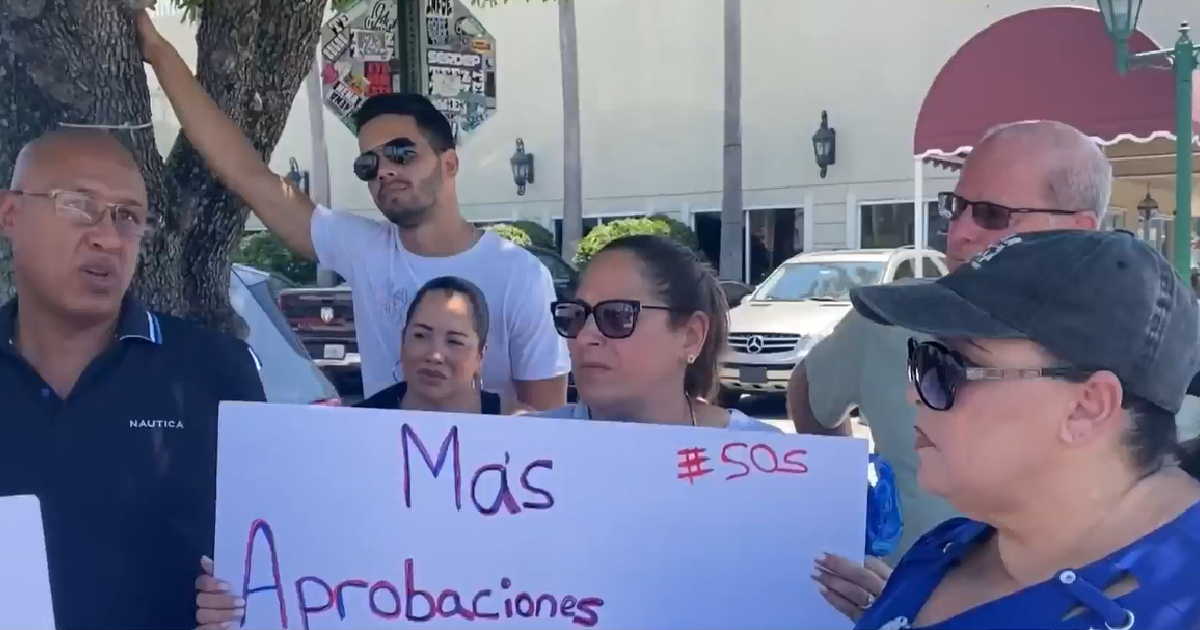Several Cuban families gathered outside the iconic Versailles restaurant in Little Havana, Miami, to demand the expedited processing of humanitarian parole applications for their relatives in Cuba.
Telemundo 51 reported that “anxiety and hope were etched on their faces as they voiced their concerns over the delays in the processing of their humanitarian parole cases, a program that would allow them to travel legally to the United States.”
One of the beneficiaries of this program, implemented by the U.S. government since January 2023, is Juan Carlos, a Cuban who expressed his frustration and despair, urging that “the process be faster... more chronological...”
Another Cuban, acting as a sponsor, named Odalis Hernández, mentioned that she calls “every week” and is told that her “processes are fine and that I just have to wait, and well, I wait diligently, but I wish they would do something... move a bit faster...”
According to data provided by the Customs and Border Protection (CBP), the number of Cubans authorized to travel to the United States "in a safe, orderly, and legal manner" reached 95,500 in April.
“Specifically, 95,500 Cubans, 184,600 Haitians, 83,800 Nicaraguans, and 109,200 Venezuelans were screened and authorized to travel,” the CBP document states.
Out of these, more than 91,000 Cubans, 166,700 Haitians, 75,700 Nicaraguans, and 101,200 Venezuelans legally entered U.S. territory “and were granted parole.”
Cuban families yearn to reunite with their loved ones in the United States, among other reasons, to escape the severe crisis currently afflicting the Island.
Energy Crisis Deepens in Cuba
Alongside food and transportation shortages, the energy crisis has worsened. Recently, Cuban leader Miguel Díaz-Canel confirmed what the people had suspected since the power outages intensified: there are no guarantees that the summer months will pass without disruptions in electricity service.
He addressed the situation from his new YouTube channel, discussing the state of electrical power generation and the short, medium, and long-term projections.
Díaz-Canel reiterated what the National Electric Union (UNE) announced days earlier: that electricity cuts will increase this month and the next due to extended maintenance work on thermoelectric plants, aiming to ensure service in July and August.
"We will have prolonged maintenance until June to minimize the inconvenience of blackouts in the summer, especially in July and August," he stated.
FAQs on Humanitarian Parole and Energy Crisis in Cuba
Here are some frequently asked questions about the humanitarian parole process and the ongoing energy crisis in Cuba, providing more insights into the current situation.
What is the humanitarian parole program?
The humanitarian parole program allows individuals to enter the United States legally for urgent humanitarian reasons or significant public benefit.
Why are Cuban families demanding faster processing?
Cuban families are urging faster processing to reunite with their relatives in the U.S. and escape the severe crisis in Cuba, including food shortages and energy outages.
What is causing the energy crisis in Cuba?
The energy crisis in Cuba is due to aging infrastructure and increased maintenance on thermoelectric plants, leading to prolonged power outages.
